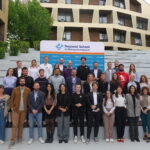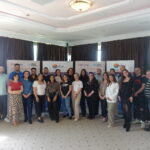Kosovo and Serbia Advocacy and Policy Group (KSPAG) represent a consortium of think tanks and NGOs who strongly believe in the process of normalization of relations between Kosovo and Serbia. The Consortium is comprised of eight likeminded NGOs: Balkans Policy Research Group (BPRG), Democracy for Development Institute (D4D), Kosovar Centre for Security Studies (KCSS) and NGO AKTIV from Kosovo, and Belgrade Fund for Political Excellence (BFPE), Belgrade Centre for Security Policy (BCSP), European Movement in Serbia (EMinS) and Lawyers Committee for Human Rights (YUCOM) from Serbia.
We were brought together by a shared energy to renew support for the deteriorating dialogue when there was little civil society interest in such initiatives. Our individual and joint efforts synergize to create innovative approaches to sustain the dialogue and transform the narrative for the public. Partners of the consortium are also members of the Berlin Process Civil Society forum where we advocate for swift and sustainable solutions to bilateral disputes.
The first Steering Committee for the launch of the new project ”Promoting and Communicating Benefits of the Kosovo-Serbia EU Facilitated Dialogue” by the Kosovo Serbia Policy Advocacy Group consortium was held in December 2018 to align the project implementation between consortium partners. The project is funded by the European Union and Norwegian Ministry of Foreign Affairs. The objective is to communicate the benefits of the technical dialogue on the normalization of relations between Kosovo and Serbia to the wider public.
This project seeks to promote and communicate the EU facilitated dialogue by bringing people and attitudes closer together. Activities have been designed to reach out to the wider public – including, Kosovo Albanians, Kosovo Serbs and Serbian citizens to highlight the ‘good news stories’ of the impact of the technical dialogue. Research will magnify the human stories that have benefited from the technical agreements and at the same time, present different perspectives and challenges of the dialogue. The peer-to-peer component offers participants opportunities to engage with other perspectives, build alliances and challenge stereotypes and misconceptions, which will contribute to constructive discussions on the dialogue.
The project foresees a number of communication and outreach activities that aim to disseminate and promote the benefits of the technical dialogue, engage in peer-to-peer cooperation, research citizens’ perceptions, and engage people at the local level to stimulate debate and enhance understanding.













